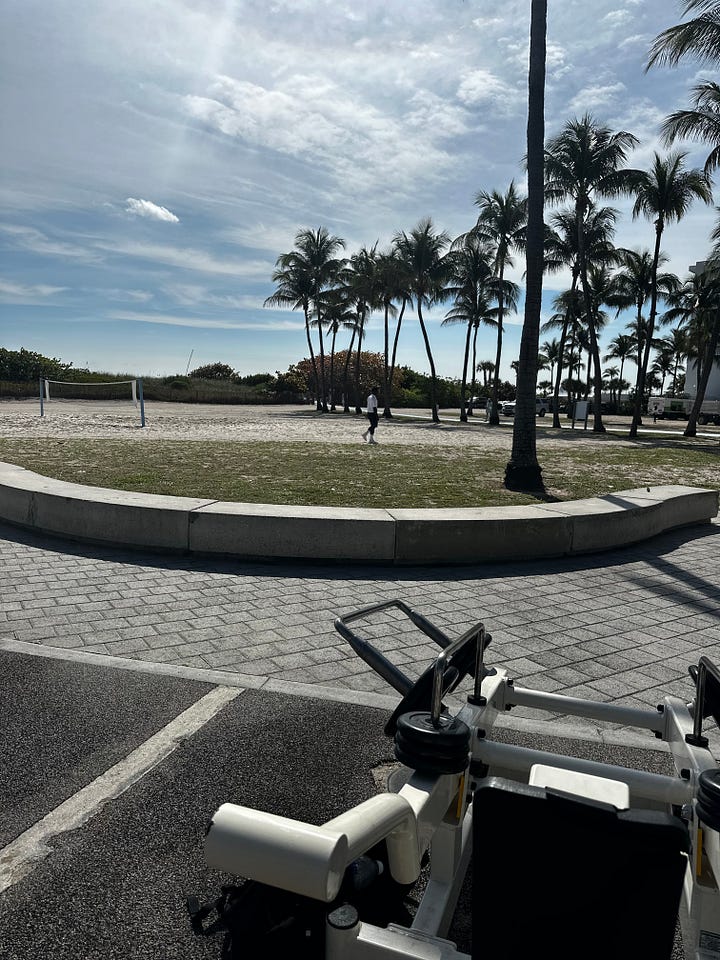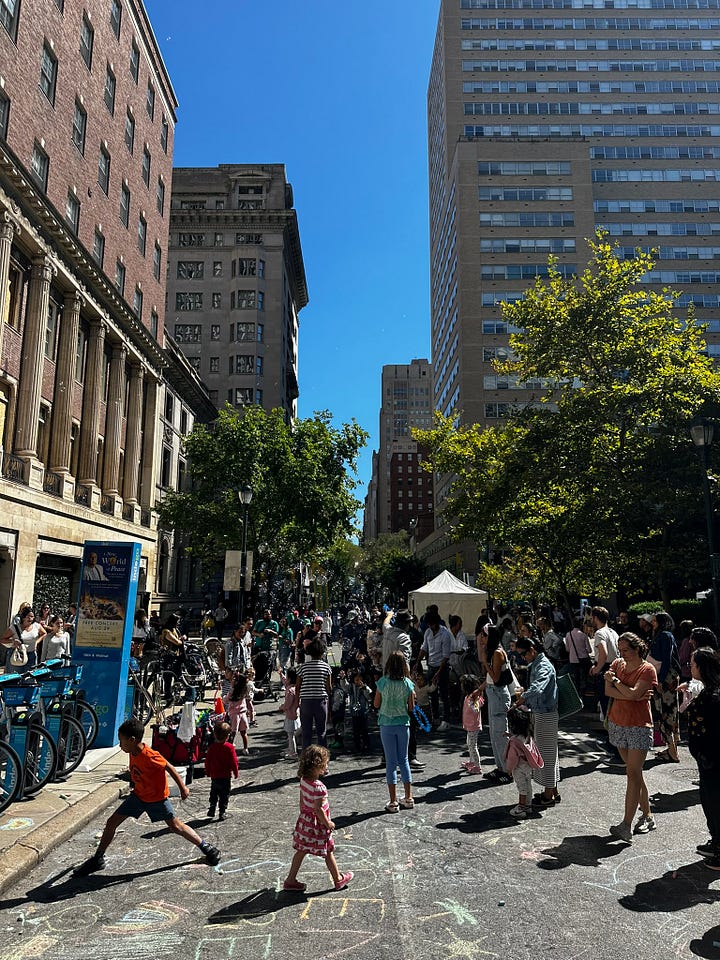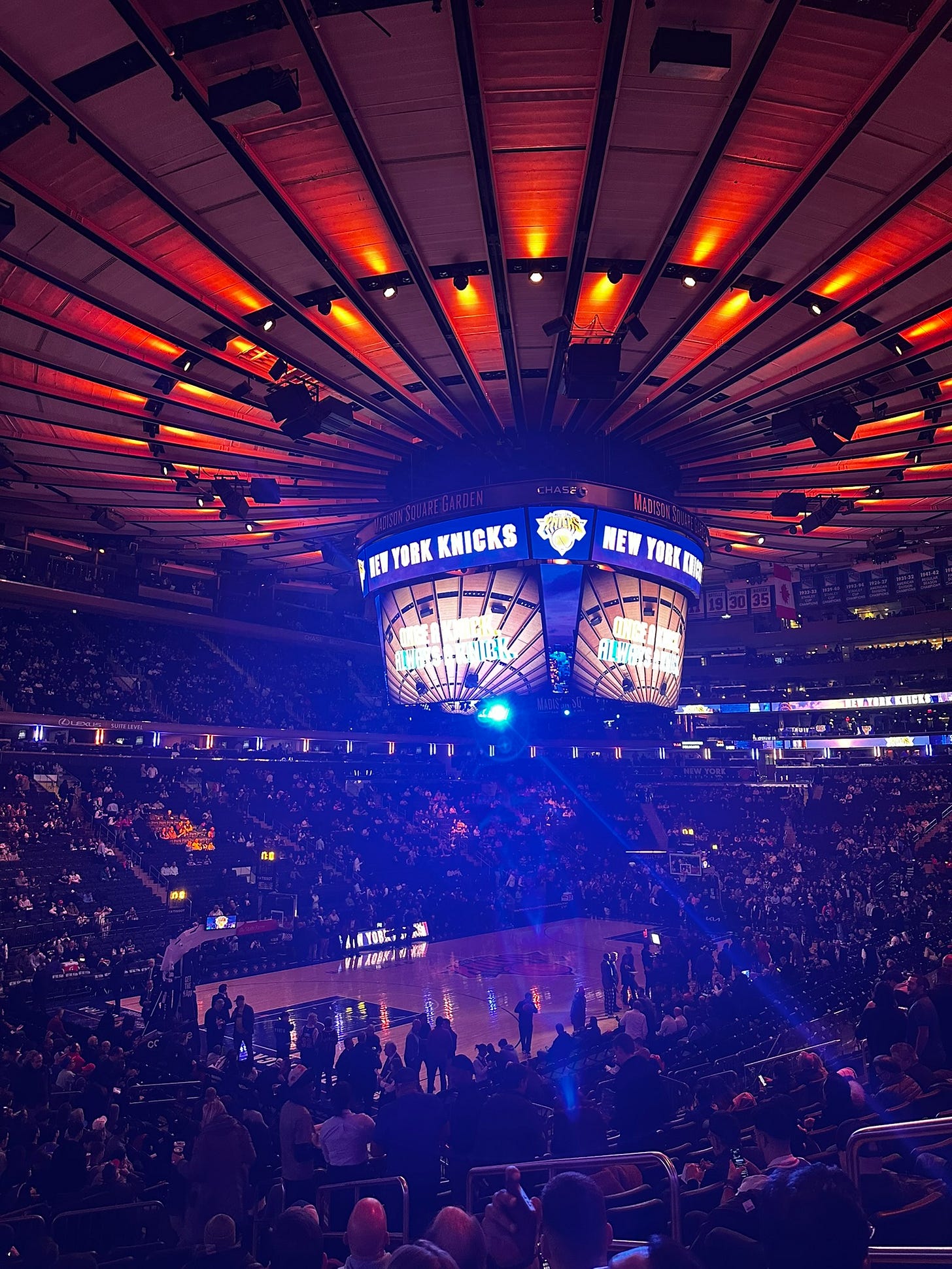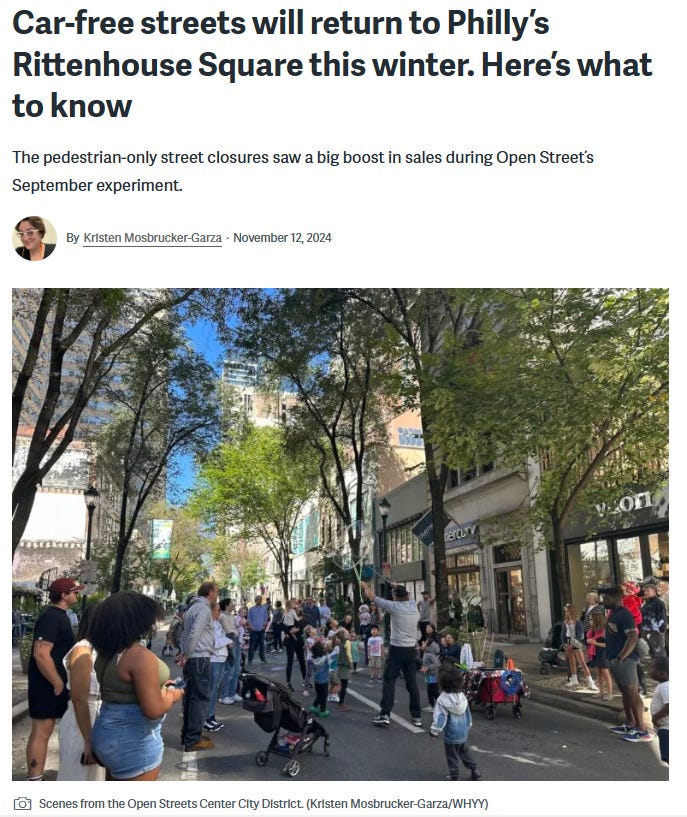RRR31: South Beach Unplugged, Market Downside, Staying Non-Partisan, Ferguson's Law, Walkability, The Genius of Darius Garland
🏖📉⚖🚶♀️🚶♂️🧠💡
While the sheriffs afraid of tariffs and trade, there’s life beyond markets and deals to be made…
In Recent Times…
⚠⚠ The following concerns a pretty cliché subject in today’s era of hyper-digitalization / instant-information. But it was on my mind, so 🤷♂️ ⚠⚠
How often are each of us ignoring opportunities for sustaining happiness and life-satisfaction in exchange for hollow dopamine hits?
We are truly hamsters on the wheel of consumption. We run remarkably fast to consume the latest meme, podcast, “hot take” on social media, or TV show on Netflix. That’s just the content we choose to consume — ads get funneled into our minds and we hardly even know it.
In fact, there is so much for us to consume, that many of us have gotten incredibly sophisticated with how we squeeze efficiency out of our day.
Unnecessary busyness is the equivalent of pawning off our agency, and even the essence of what it means to have humanity. If you’re feeling lost or overwhelmed, don’t consume more to try and fix it.
Go dark — disappear for a little bit, go for a three-hour walk, take a vacation and zap your technology usage if you can. Do something, anything, except more of the same.




I was fortunate to escape the freezing weather up north last week, and I made a point of not consuming too much information.
I worked out, took some walks, met friends for dinner, played chess, and allowed myself about four hours on one rainy day to read.
I let my mind completely unwind, and I’m feeling great as a result 🧠💪.
Content Corner 📖🎙📺
This Next Market Crash Will Break Our Fragile Brains, by Quoth the Raven
Though the tune of buying the dip has hardly changed, the environment it’s being sung in has. Stocks now trade at a Shiller PE that’s approaching 40x, a level only eclipsed once in history during the 2000s dot-com bubble.
But if the market’s price-to-earnings ratio and the macroeconomy didn’t matter when stocks were trading at 30x earnings, why should they matter with stocks trading at 40x earnings?
This indifference to valuations—helped along by the “passive bid” of 401(k)s and ETFs consistently buying the market at any given price (well explained by Bill Fleckenstein here on Julia LaRoche’s podcast, and then updated here during his appearance last week), combined with what is widely perceived to be an unlimited Fed put, combined with the unprecedented amount of liquidity doled out as a result of COVID, combined with the stock market becoming accessible to literally any human being on earth that wants to take their shot thanks to the advent of retail trading apps—has distorted expectations and psychology not just about the stock market, but also about the basic fundamentals of economics and finance, in a way that many of us probably would not have even thought fathomable 50 years ago.
I enjoyed this “bearish” coverage of the current state of markets if for no other reason than that it succinctly highlights the many factors that are pushing valuations so high.
I especially appreciated the callout on 401k accounts — “passive bid” is a great way to describe it.
From here, a sharp and decisive move lower in markets probably first comes as the result of an economy grinding slower, and then, in dramatic fashion, the quick cascade of deleveraging and speculation unwinding will torture people financially. But psychologically is where it is really going to torture a whole new generation of investors who have yet to feel any significant prolonged financial pain. Think about it: the COVID crash was over in a couple of weeks.
This means that there is an entire market full of investors who have not felt any type of prolonged recession or drawdown in markets. And they have definitely not felt a depression or the psychological uncertainty of what can happen if the market loses confidence in the currency or the creditworthiness of the United States.
As a fairly new market participant (5 years or so if you don’t count 401k), the worst thing I’ve seen wasn’t the COVID crash, but the obliteration of “tech” stocks during 2022.
Yet, there was nothing “prolonged” about that. What would it even look like if another true economic crisis came knocking at the door?
I don’t have the answers, but it’s healthy to be aware of the downside risks that are looming around the corner, even if they never come out to show themselves.
More tips for being non-partisan in a partisan age, by Greg Lukianoff
In our modern world, every topic that makes it into the public sphere quickly has two diametrically opposed versions of the “truth”.
Within a day or so of an issue being prominent, it seems like everyone you know has perfectly recited one of those two versions, with little ability to acknowledge the often glaringly obvious faults in their position.
For what its worth, not many versions of the “truth” are lacking more substance than the newly popular myth that Russia is completely justified in their campaign in Ukraine.
In any event, we do need to stand guard to ensure that absurd stances taken up by a group of people does not condemn them to being wrong about everything. In fact, it’s unusual that anyone is 100% wrong, 100% of the time.
Enter this piece with genuinely helpful tips on how to operate without bias, at a time when that is needed more than ever:
The first lesson was, basically, that we should all have a fierce and unwavering commitment to our principles — or, as we like to say at FIRE, Be willing to drive the bus into a wall before compromising them.
The second lesson was to consciously and actively promote and preserve viewpoint diversity among your ranks. Whether it’s your staff or your social circles, ideological bubbles and echo chambers are where free expression and the free exchange of ideas go to die. Once that happens, innovation, progress, and any hope of achieving your goals won’t be far behind. The alternative is gathering a cohort of smart people from different backgrounds and with differing perspectives who can disagree honestly and work together. This creates an environment in which your assumptions and arguments are constantly tested, sharpened, and improved upon.
People really do matter. Can you think of truly transformative moments in your life where you leveled up your way of thinking without anyone else influencing you in that direction? I most certainly cannot.
There are many more helpful tips and examples of how to apply them in the full article.
Ferguson’s Law ⚖
The extent to which debt servicing exceeds defense spending is historically an advance indicator of great power decline. Financial capacity determines a great power’s ability to project military strength and sustain a commensurate military infrastructure. Regardless of regime type, every state faces competing foreign and domestic claims on its resources. When such commitments in total exceed annual revenues, the state runs deficits, debt accumulates, and interest payments rise (unless the rate of interest simultaneously declines).
In 2024 the U.S. began violating Ferguson’s law, and many projections see the problem getting worse, not better, in the immediate term.
Maybe not the best time for massive tax cuts?
Of course, Ferguson’s law is not actual law. Yet, it’s a convenient framework from which to view the vulnerable position the U.S. is actually in.
The budgetary axe that cuts spending for the sake of debt service is often the harbinger of broader fiscal strains and political instability. “Austerity measures” are seldom without direct political consequences. They can exacerbate political polarization, stoke popular dissatisfaction with a state’s ruling elite, or sow dissension within the elite itself. All else being equal, a fractured polity will face greater difficulties in forming a durable political consensus that prioritizes external military commitments over internal civilian ones
Read the full paper here.
Culdesac, Tempe
Here’s a cool story about a subculture I love.
It’s been two years since Culdesac Tempe, the self-proclaimed "first car-free neighborhood in America," opened with a goal of making walkability its centerpiece. With the first phase finished last year, the high-profile development continues to unfold on a 17-acre site along a light rail line in an established neighborhood about 15 miles east of downtown Phoenix. The $200 million project now includes 288 apartment units with about 300 tenants, reeling residents in with appeals of a healthier, more eco-friendly lifestyle, built-in community with ample amenities, and accessible transit to Tempe and the greater metro area.
I’ve always loved walkable neighborhoods — there’s something beautiful about walking 4-5 miles as you go about your business on a nice day. Similarly, it’s great when cars take a back seat to us humans, for a change. This is especially true given the epidemic of reckless and distracted driving, cc: Andy Boenau
Instead of broad asphalt streets, a series of paseos between 10- and 15-feet wide stretch between clusters of flat-topped, irregularly situated two- and three-story buildings coated in heat-deflecting white stucco and sporadically adorned with vibrant murals. Walkways open onto brick courtyards and communal spaces ornamented with public art.
"It reminds me of Mykonos," Murdock says, however surprising that might sound. "The walkways, which limit sun and heat exposure, wind between bright-white buildings while color accents make the whole thing feel bright and welcoming."
While there aren’t full car-free neighborhoods, walkability and enhancing the experience of people on the streets is growing in popularity around the U.S.
It’s something that my home of Philadelphia has experimented with a lot recently:
Here are some of my own photos from car-free Sundays this past summer:


Just people enjoying the outdoors, and having a good time. Plus, this turned out to be great for retail in the area!
I’m glad this pro-human uprising is gaining some momentum 😄.
The Genius of Darius Garland 🧠💡🎯
It shouldn’t come as a surprise to the basketball world that Darius Garland is putting together a historically great season.
After all, Steph Curry himself was heaping praise on the then 21-year-old upstart back in 2021.
I too, have been a fan of Garland since I saw him emerge on the NBA stage. His ball handling and shooting popped off the screen the first few times I got to watch him play. Most of all, though, I saw he had the right ingredients to be a good corporate citizen within the confines of an NBA offense.
Willingness to get off the ball, intelligence when spacing the floor, and moving/relocating without the ball are some examples of the positive traits he had coming into the league.
With a few years under his belt, he’s nearly mastered the art of passing, and those great qualities I mentioned are a big reason that the Cavaliers have been unstoppable this season, boasting the second best offensive and net rating in the league.
He’s also separating himself as an offensive threat by using his almost unnatural quick twitch movement. There’s nothing more difficult to defend effectively than someone with his combination of quickness, change of direction / pace, precise ball handling, and complete package of shots to choose from.
Check out the first few minutes of this video, where you can see it all on display — perfect pocket passes, hesitation dribbles, shot fakes, and composure with the ball when getting into the painted area. Specifically, watch how the threat of his floater shots in the paint can draw the rim protector from the defense out, setting up his assists at the basket.
And those three-point shots… 👌
Some Tunes Before We Go 🎶🎵🎼🎧
See you next time!
-Tiko




One reason car-free events are worthwhile is that they help people imagine a car-lite existence. e.g. Having 2 family vehicles instead of 3, or 1 instead of 2.